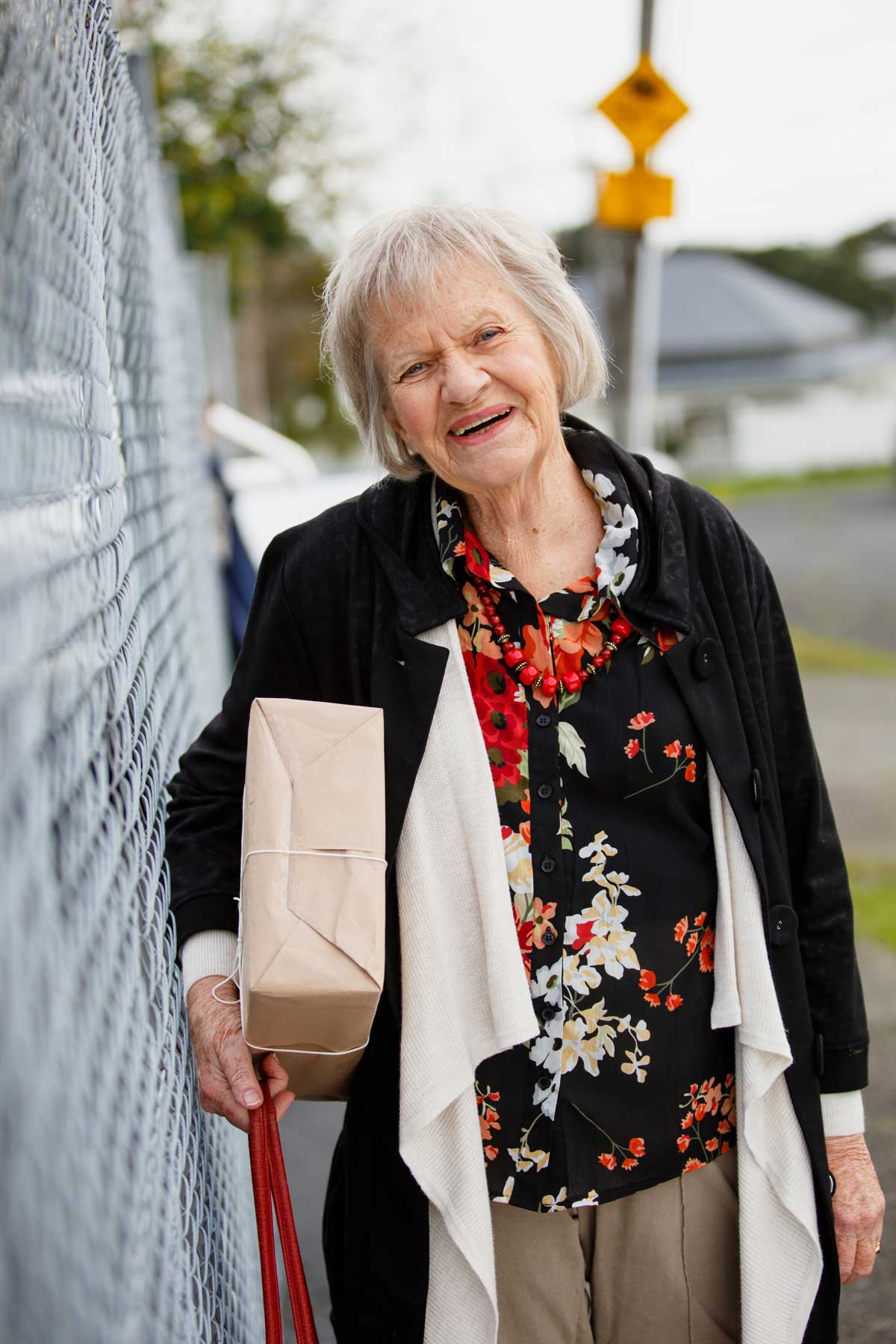In the otherwise empty auditorium of the majestic Hopetoun Alpha – a former church turned theatre in the heart of Auckland – continuous laughter reverberates around the 142-year-old walls.
Stuart Devenie is regaling his fellow actors with a story about a taxi trip he once took from Auckland to Wellington. They’re old friends, these four – each a legend in New Zealand’s rich history of performing arts.
Of course, they’ve worked together many times – on radio, television, movies and in their principal love, theatre. And most recently they’ve been reunited for the fourth series of quirky Kiwi detective drama The Brokenwood Mysteries, which has just wrapped up on Prime TV.
In descending order of age, Ken Blackburn, 82, Elizabeth McRae, 81, Ian Mune, 76, and Stuart Devenie, 66, all appear in the final episode of the series, which revolves around a band of murder suspects in an aged care facility.
Over a highly entertaining hour, they shared with The Australian Women’s Weekly how they’ve managed to make their living through acting, some of their most hilarious moments on stage and screen, handing on the baton to the next generation of actors, and facing the spectre of retirement.

Ken’s in a scene of The Brokenwood Mysteries
On Alzheimer’s
Stuart: Alzheimer’s is what ties us all together in this Brokenwood Mysteries episode. Ken and Ian’s characters are kind of a bit shaky, so you can see why they were cast. Liz and I are completely okay, which is why we were cast. (Laughter.)
Elizabeth: I’ve been in every episode. They wanted to make it look like it was the one place, the one town… What is it – Ferndale?
Stuart: No, no, that’s the other one you were in. Ferndale is Shortland Street. This town is Brokenwood.
(Ian, arms folded, rocks back in his chair and lets out a loud cackle.)
Elizabeth: Well, it’s a place in New Zealand that has an enormous number of murders.
Stuart: And a place where some older people actually remain alive. It’s a fantastic series, and I was very honoured to be asked to be part of it.
Ken: It’s very, very popular in France and Germany, would you believe?
(Three million people watch each episode in France. It’s also shown in Denmark, Italy, Ireland, Scotland, Malta, Bulgaria, Sweden, England, the United States and Canada.)
Ken: And, of course, we speak all of those languages.
Stuart: I think it’s popular because it’s bucolic. It has a kind of rural, mythical quality about it and the French are very into that.
Ken: Well, the alternative is the American ones that are all about car crashes, and shooting people.
Stuart: In our episode, the main suspects are all connected to the care facility, Sunset Manor. The murderer has been fingered as being somewhere in that institution. (A police dog leads the detectives into a sit-and-be-fit class.) The script is wonderful, a classic whodunit. Tim Balme, who wrote the episode, was one of my students when I was teaching at Toi Whakaari [New Zealand Drama School] in 1984 – he was one of a golden year. It was wonderful to come full circle with him.
Ian: For a number of us, though, the show got less and less funny, and more and more depressing. Emptying your brain and playing someone with Alzheimer’s is not fun.
Ken: It’s more difficult to play vacancy than it is awareness. I found it difficult to have an intelligent conversation between shots.
Elizabeth: It’s unusual that I didn’t have Alzheimer’s, because usually when they’re casting for a female with Alzheimer’s, they immediately think of me. (More laughter.)

A scene from the fourth season of The Brokenwood Mysteries, featuring Elizabeth.
On the early years
The quartet effortlessly reels off the many projects they have worked on together: from being on the stage in The God Boy, to the 1970s television drama series Moynihan, and even voicing an animated cartoon.
Stuart: The business until about the mid-70s was quite small in New Zealand, so we worked with each other a lot in different media. Now it’s at least four times as big.
Elizabeth: There’s great joy in working with people you’ve worked with before. You know where they’re coming from.
Stuart: In our lexicon, a company is not a commercial enterprise, but a group of people who work consistently together over a period of time. In the old guild system there was a hierarchy: apprentice, journeyman, master. Now everyone is a journeyman; everyone is travelling around in order to get the work. Working with people consistently over time is something we have to try to retrieve somehow.
Ken: But we will never get back to what we were. We were the senior actors as very young people. I have played old men since I was 21. I want to go back and play the young lover; I’ve never had a crack at it!
Stuart: We were the fastest actors in the West: all of us have gone through the experience of having a radio call in the morning, a commercial at lunchtime, a TV rehearsal in the afternoon, and a theatre performance at night. All through the 70s, that was the working life of a successful actor. It wasn’t really until Shortland Street that you began to develop this specialisation. Now we have extremely good television actors – but they are solely television actors.
Elizabeth: It was only when Shortland Street came along, where you could stay in a show for a while, that people could save enough money to buy a house. Though I don’t know if they can do that now…
Ian: I started off as an actor saying, “I never want to be a director.” But when I came back from overseas and found there was no acting work, I became a director. I moved into acting on television, directing film, and then writing for radio, television and film. The only way I could survive – with three kids – was to do everything. People ask me which do I like best? It’s whichever I’m doing at the time.
Stuart: We’ve been lucky that we’ve all made a living out of this job. We haven’t had to wait tables too much!
Ken: I’ve done no other job in 60 years but acting.
Ian: As a result of this life, I myself am entirely unemployable. I couldn’t do a regular job. I work my ring off for the period of time the job is on. But to be turning up nine-to-five? They would fire me… or I just wouldn’t turn up.

Ian (centre) in a scene from The Brokenwood Mysteries
On acting nightmares
All four actors admit they’ve made their fair share of gaffes over the decades, and that they still do. But it’s part of the allure.
Stuart: The difference between theatre and screen is if you make a fluff on screen, you can go back and fix it. You can’t do that when you are live in front of an audience. That danger is what I love.
Ken: Being able to rescue yourself, or someone else, is one of the grandest moments in theatre.
Elizabeth: We spend a lot of time preparing for a role, and to be unprepared is our worst nightmare. I did a play recently where I had a lot to say and I found learning the lines incredibly difficult. When I was younger I said that would never happen to me; learning lines was so easy. But it was so stressful, I will never do a big show again.
Ken: When in doubt, stand still. I always say that to young actors. The importance of stillness is the most important thing you can do. You are attracting the most attention; it’s not the one thinking they’re acting. I learned that from [distinguished American actor and director] Sam Wanamaker. He said, “Don’t just do something, stand there.”
Ian: When I lived in LA, I’d go to the Actors Studio on Saturdays, where they would invite famous movie stars to critique actors’ work. I’d just come from four years at the Mercury Theatre [in Auckland], playing every imaginable role and directing. But when these US actors tried to do theatre, there was something desperately wrong. They had absolutely no theatrical nous; they acted from the neck up. I got an agent who said, “We need to promote you, go and get photos,” and I realised she was having trouble promoting me. They promoted to type, and I am no type. I’m an empty shell, waiting for the new part to fill me up. On the way through the airport coming back to New Zealand, I dumped my photos in the rubbish bin.
Ken: It’s the challenge of the varieties which has been the joy of working in this country. To know you’ve given a performance eight metres under water, or on horseback, or in a helicopter. In fact, I nearly got killed by a helicopter in Queenstown, when my raincoat belt buckle got caught in the skid, and I nearly pulled it down on top of me!
Elizabeth: The worst thing I had to do was take the semen from a bull. It played as the credits went down, in the movie Jubilee. It took an entire day to do the bloody shot!
Ian: I had to shave my head for a play, but I’d left straggles of hair. My make-up was all scabs. One dress rehearsal went on forever, and I didn’t bother taking my make-up off when I went home. In the morning my wife Jo made me breakfast in bed, but when she came back in and saw me, she screamed, and threw the breakfast in the air. I ended up with bacon and eggs all over me.

On love and retirement
Ken: I don’t think there’s any doubt about it, theatre is our first love. It’s that sense of immediacy you have with the audience that you don’t get with television or film.
Elizabeth: It’s wonderful to be playing someone else, and they stay with you, no matter what you’re doing – whether you’re doing the housework or whatever. You have that other person there that you are gradually getting to be.
Ken: I wouldn’t change my life for the world. Retirement is filthy four-letter word which is never mentioned at my house. So I will keep going, I’m sure. Actors are born, and they die the same way.
Stuart: Yes, actors don’t retire; they keep going until the final curtain call.
Ken: And when I get carried out at my funeral, I want to be brought back in.
(Cue more hilarity.)


